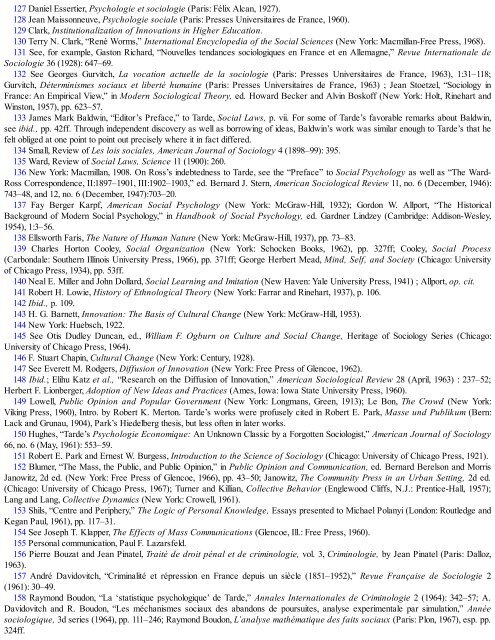3658925934
You also want an ePaper? Increase the reach of your titles
YUMPU automatically turns print PDFs into web optimized ePapers that Google loves.
127 Daniel Essertier, Psychologie et sociologie (Paris: Félix Alcan, 1927).<br />
128 Jean Maissonneuve, Psychologie sociale (Paris: Presses Universitaires de France, 1960).<br />
129 Clark, Institutionalization of Innovations in Higher Education.<br />
130 Terry N. Clark, “René Worms,” International Encyclopedia of the Social Sciences (New York: Macmillan-Free Press, 1968).<br />
131 See, for example, Gaston Richard, “Nouvelles tendances sociologiques en France et en Allemagne,” Revue Internationale de<br />
Sociologie 36 (1928): 647–69.<br />
132 See Georges Gurvitch, La vocation actuelle de la sociologie (Paris: Presses Universitaires de France, 1963), 1:31–118;<br />
Gurvitch, Déterminismes sociaux et liberté humaine (Paris: Presses Universitaires de France, 1963) ; Jean Stoetzel, “Sociology in<br />
France: An Empirical View,” in Modern Sociological Theory, ed. Howard Becker and Alvin Boskoff (New York: Holt, Rinehart and<br />
Winston, 1957), pp. 623–57.<br />
133 James Mark Baldwin, “Editor’s Preface,” to Tarde, Social Laws, p. vii. For some of Tarde’s favorable remarks about Baldwin,<br />
see ibid., pp. 42ff. Through independent discovery as well as borrowing of ideas, Baldwin’s work was similar enough to Tarde’s that he<br />
felt obliged at one point to point out precisely where it in fact differed.<br />
134 Small, Review of Les lois sociales, American Journal of Sociology 4 (1898–99): 395.<br />
135 Ward, Review of Social Laws, Science 11 (1900): 260.<br />
136 New York: Macmillan, 1908. On Ross’s indebtedness to Tarde, see the “Preface” to Social Psychology as well as “The Ward-<br />
Ross Correspondence, II:1897–1901, III:1902–1903,” ed. Bernard J. Stern, American Sociological Review 11, no. 6 (December, 1946):<br />
743–48, and 12, no. 6 (December, 1947):703–20.<br />
137 Fay Berger Karpf, American Social Psychology (New York: McGraw-Hill, 1932); Gordon W. Allport, “The Historical<br />
Background of Modern Social Psychology,” in Handbook of Social Psychology, ed. Gardner Lindzey (Cambridge: Addison-Wesley,<br />
1954), 1:3–56.<br />
138 Ellsworth Faris, The Nature of Human Nature (New York: McGraw-Hill, 1937), pp. 73–83.<br />
139 Charles Horton Cooley, Social Organization (New York: Schocken Books, 1962), pp. 327ff; Cooley, Social Process<br />
(Carbondale: Southern Illinois University Press, 1966), pp. 371ff; George Herbert Mead, Mind, Self, and Society (Chicago: University<br />
of Chicago Press, 1934), pp. 53ff.<br />
140 Neal E. Miller and John Dollard, Social Learning and Imitation (New Haven: Yale University Press, 1941) ; Allport, op. cit.<br />
141 Robert H. Lowie, History of Ethnological Theory (New York: Farrar and Rinehart, 1937), p. 106.<br />
142 Ibid., p. 109.<br />
143 H. G. Barnett, Innovation: The Basis of Cultural Change (New York: McGraw-Hill, 1953).<br />
144 New York: Huebsch, 1922.<br />
145 See Otis Dudley Duncan, ed., William F. Ogburn on Culture and Social Change, Heritage of Sociology Series (Chicago:<br />
University of Chicago Press, 1964).<br />
146 F. Stuart Chapin, Cultural Change (New York: Century, 1928).<br />
147 See Everett M. Rodgers, Diffusion of Innovation (New York: Free Press of Glencoe, 1962).<br />
148 Ibid.; Elihu Katz et al., “Research on the Diffusion of Innovation,” American Sociological Review 28 (April, 1963) : 237–52;<br />
Herbert F. Lionberger, Adoption of New Ideas and Practices (Ames, Iowa: Iowa State University Press, 1960).<br />
149 Lowell, Public Opinion and Popular Government (New York: Longmans, Green, 1913); Le Bon, The Crowd (New York:<br />
Viking Press, 1960), Intro. by Robert K. Merton. Tarde’s works were profusely cited in Robert E. Park, Masse und Publikum (Bern:<br />
Lack and Grunau, 1904), Park’s Hiedelberg thesis, but less often in later works.<br />
150 Hughes, “Tarde’s Psychologie Economique: An Unknown Classic by a Forgotten Sociologist,” American Journal of Sociology<br />
66, no. 6 (May, 1961): 553–59.<br />
151 Robert E. Park and Ernest W. Burgess, Introduction to the Science of Sociology (Chicago: University of Chicago Press, 1921).<br />
152 Blumer, “The Mass, the Public, and Public Opinion,” in Public Opinion and Communication, ed. Bernard Berelson and Morris<br />
Janowitz, 2d ed. (New York: Free Press of Glencoe, 1966), pp. 43–50; Janowitz, The Community Press in an Urban Setting, 2d ed.<br />
(Chicago: University of Chicago Press, 1967); Turner and Killian, Collective Behavior (Englewood Cliffs, N.J.: Prentice-Hall, 1957);<br />
Lang and Lang, Collective Dynamics (New York: Crowell, 1961).<br />
153 Shils, “Centre and Periphery,” The Logic of Personal Knowledge, Essays presented to Michael Polanyi (London: Routledge and<br />
Kegan Paul, 1961), pp. 117–31.<br />
154 See Joseph T. Klapper, The Effects of Mass Communications (Glencoe, Ill.: Free Press, 1960).<br />
155 Personal communication, Paul F. Lazarsfeld.<br />
156 Pierre Bouzat and Jean Pinatel, Traité de droit pénal et de criminologie, vol. 3, Criminologie, by Jean Pinatel (Paris: Dalloz,<br />
1963).<br />
157 André Davidovitch, “Criminalité et répression en France depuis un siècle (1851–1952),” Revue Française de Sociologie 2<br />
(1961): 30–49.<br />
158 Raymond Boudon, “La ‘statistique psychologique’ de Tarde,” Annales Internationales de Criminologie 2 (1964): 342–57; A.<br />
Davidovitch and R. Boudon, “Les méchanismes sociaux des abandons de poursuites, analyse experimentale par simulation,” Année<br />
sociologique, 3d series (1964), pp. 111–246; Raymond Boudon, L’analyse mathématique des faits sociaux (Paris: Plon, 1967), esp. pp.<br />
324ff.









![Genki - An Integrated Course in Elementary Japanese II [Second Edition] (2011), WITH PDF BOOKMARKS!](https://img.yumpu.com/58322134/1/180x260/genki-an-integrated-course-in-elementary-japanese-ii-second-edition-2011-with-pdf-bookmarks.jpg?quality=85)
![Genki - An Integrated Course in Elementary Japanese I [Second Edition] (2011), WITH PDF BOOKMARKS!](https://img.yumpu.com/58322120/1/182x260/genki-an-integrated-course-in-elementary-japanese-i-second-edition-2011-with-pdf-bookmarks.jpg?quality=85)





